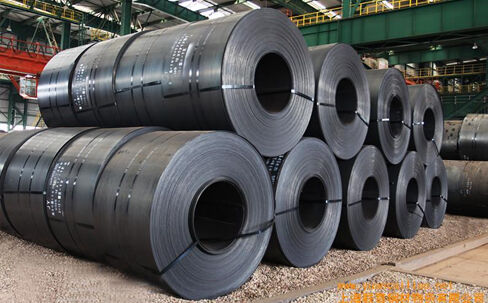
Carbon steel coils, an alloy mainly composed of iron and carbon, have become the backbone of numerous industries due to their exceptional properties. Their combination of strength, durability, and cost - effectiveness makes them an ideal choice for a wide range of applications.
In the construction industry, carbon steel coils play a fundamental role. Structural components such as beams, columns, and trusses are often fabricated from carbon steel coils. For example, in high - rise buildings, the structural integrity depends heavily on the strength of these components. Hot - rolled carbon steel coils, with their high strength - to - weight ratio, are preferred for large - scale construction projects. They can withstand significant loads and provide stability, ensuring the safety of the building occupants.
Roofing systems and wall panels also frequently utilize carbon steel coils. Galvanized carbon steel coils, which have a protective zinc coating, are highly resistant to corrosion. This makes them suitable for outdoor applications, as they can endure harsh weather conditions, including rain, snow, and UV radiation, without significant degradation. In addition, carbon steel coils are used in the production of pipes, tubes, and fittings for plumbing and HVAC systems. Their excellent formability allows for easy shaping into the required sizes and shapes, and their durability ensures long - term functionality.
The automotive industry relies on carbon steel coils for a variety of components. Chassis components, body panels, and structural reinforcements are commonly made from carbon steel. High - strength carbon steel coils are used to enhance the safety and crashworthiness of vehicles. For instance, the frames of cars are often constructed using high - strength low - alloy (HSLA) carbon steel coils. These materials can absorb a large amount of energy during a collision, reducing the risk of injury to passengers.
The corrosion resistance of carbon steel coatings is also crucial in automotive applications. Parts such as exhaust systems, which are exposed to high temperatures and corrosive gases, require materials that can withstand these harsh conditions. Carbon steel coils with appropriate coatings can meet these requirements, ensuring the longevity of the components. Additionally, carbon steel coils are used in the production of suspension components and fasteners, where their strength and reliability are essential for the smooth operation of the vehicle.
In machinery manufacturing, carbon steel coils are used to create machine frames, supports, and bases. These components need to be strong and stable to ensure the proper functioning of the machinery. For example, in industrial machines like lathes and milling machines, the frames made from carbon steel coils provide a solid foundation, minimizing vibrations and ensuring accurate machining operations.
Gears, shafts, and bearings are also often made from carbon steel coils. Medium - carbon steel coils, such as 45# carbon steel, are popular for these applications due to their high strength and good machinability. After processing, the surface finish of the carbon steel can meet the precision requirements of mechanical operation. The excellent mechanical properties of carbon steel ensure that these components can withstand high loads and rotational speeds without deformation or failure, providing a reliable performance in various machinery.
Carbon steel coils find applications in the electrical and electronics industry as well. Electrical enclosures, switchgear cabinets, and control panels are commonly made from carbon steel. The material's ability to provide a protective shield for sensitive electrical components is highly valued. Carbon steel coatings can also offer good electrical conductivity, which is essential for efficient power distribution within these enclosures.
Electrical conduits, cable trays, and support systems are also fabricated from carbon steel coils. These components are used to route and protect electrical wires and cables, ensuring the safe and reliable operation of electrical systems in buildings, factories, and other facilities.
Aerospace and Defense: Although more advanced materials like composites and titanium alloys are also used, carbon steel coils still play a role in certain aircraft components such as some structural frames and engine parts where their strength and cost - effectiveness are beneficial. In the defense industry, they can be used in the construction of military vehicles and equipment.
Household Goods and Packaging: Low - carbon steel coils are widely used in the production of household items such as cans, cutlery, and small appliances. Their low cost and good formability make them suitable for mass - production. In the packaging industry, steel coils are used to make metal containers for storing and transporting various products due to their strength and ability to protect the contents.
Transportation Infrastructure: Carbon steel coils are used in the construction of railway tracks, bridges for roads and railways, and shipping containers. Railway tracks need to be strong and durable to withstand the constant weight and movement of trains, and carbon steel coils can be processed into the appropriate shapes and sizes to meet these requirements. Shipping containers made from carbon steel coils can endure the harsh conditions of long - distance ocean transportation.
